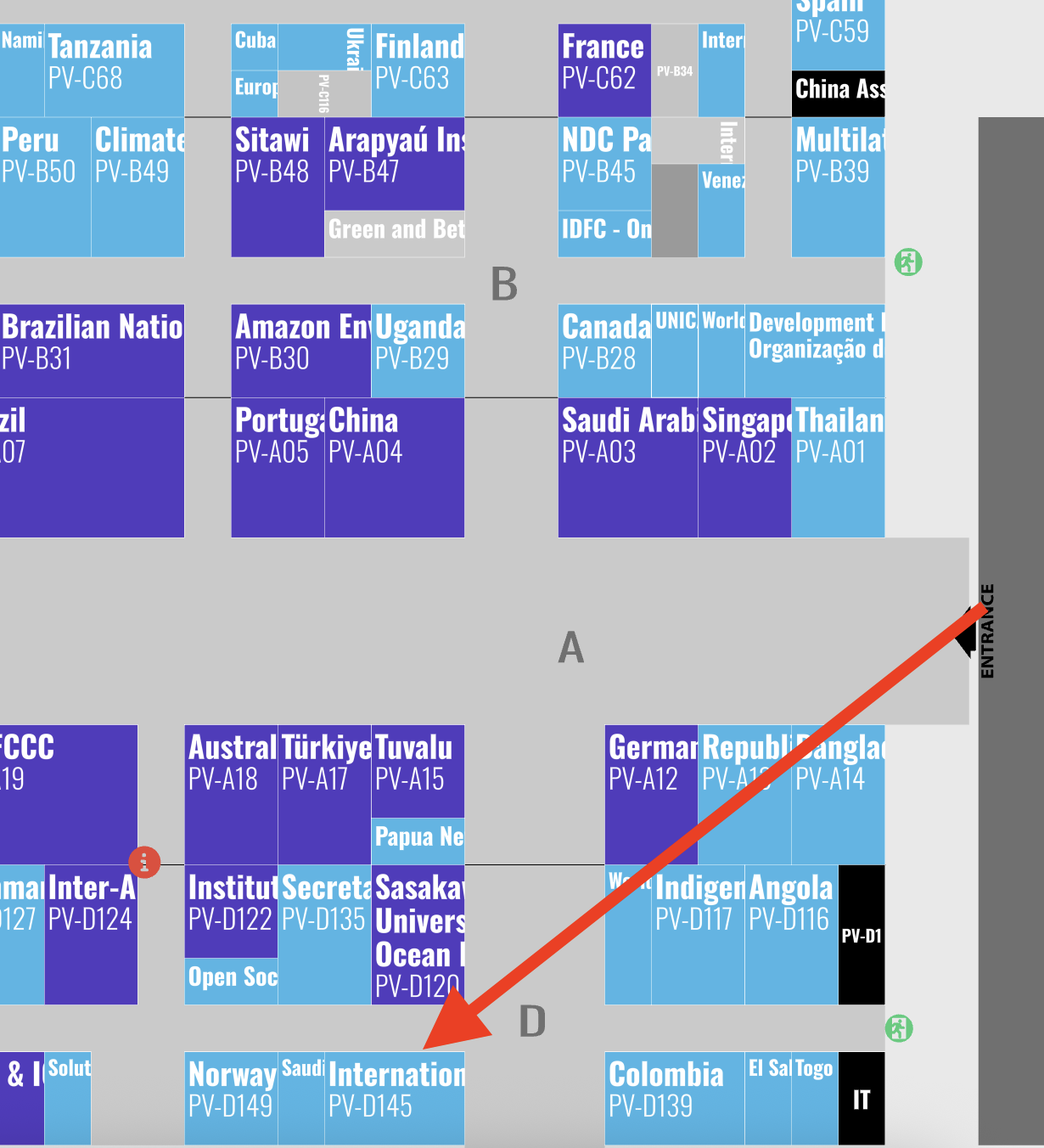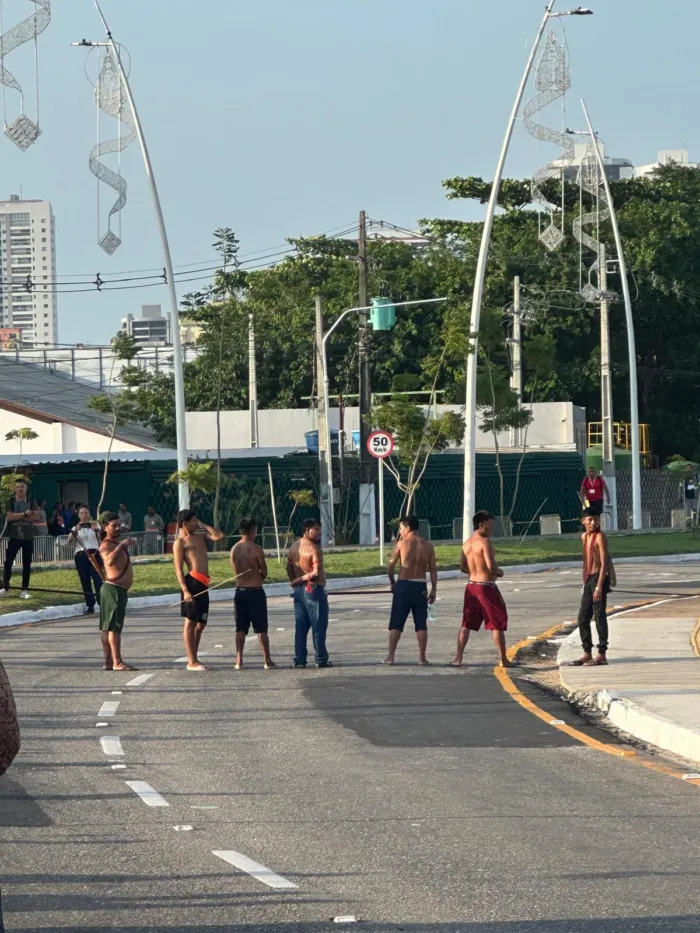
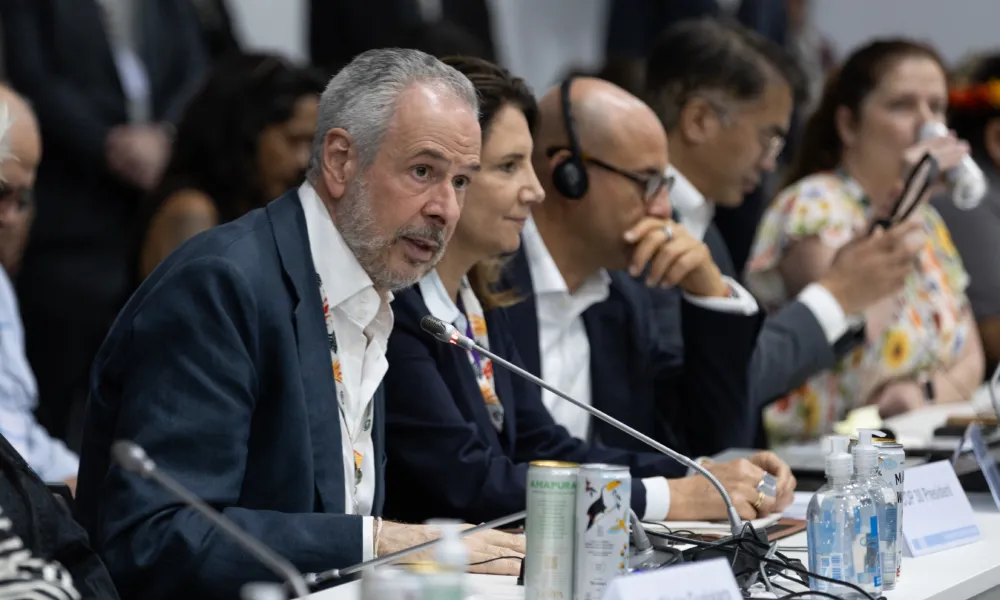
COP30 President André Corrêa do Lago faced representatives from indigenous communities groups in a special session after more protests took place this morning. Photo: UNFCCC
Day 5: 14 NOVEMBER 2025
Delegates were under pressure to complete their deliberations by the end of Friday in order to be able to send agreed decision texts to ministers next week, but it's going to be a tough task, with talks continuing late on Friday.
The main issue for the Presidency is how to proceed on the four supplemental items that were proposed for the COP agenda, but which have been sent into informal negotiations. Brazil must find a way to incorporate these into the agenda, or quietly shunt them to a later COP.
We heard a number of complaints that the supplementary issues of finance and "unilateral trade barriers" have been cropping up in other areas of the talks, for example the negotiations track on the Just Transition pathway. It appears that Brazil's diversion of late additions to the agenda into separate consultations has merely let these issues roam freely over the COP grounds and pop up wherever they can.
On Wednesday this week the Independent High-Level Expert Group on Climate Finance (IHLEG) issued the fourth edition of its report on climate finance, commissioned by the presidencies of COP29 and COP30.
This edition focuses on fulfilling the integrated climate finance agenda in support of the Baku to Belém Roadmap to 1.3T, proposing a three-pillared pathway to mobilise and deploy the target sum of $1.3 trillion a year by 2035.
The report is led by economists Nicholas Stern of the UK and Vera Songwe of Cameroon, Amar Bhattacharya, and Éléonore Soubeyran.
And on a similar note, Oxford University's Smith School of Enterprise and Environment published a report that finds a rapid switch to renewables could double energy-sector productivity in low-to-middle income economies within 25 years. In many countries, this would result in a GDP boost by mid-century of around 10%.
The COP also published draft decision text on Loss & Damage.
We will send an abbreviated daily report on Saturday with any updates.
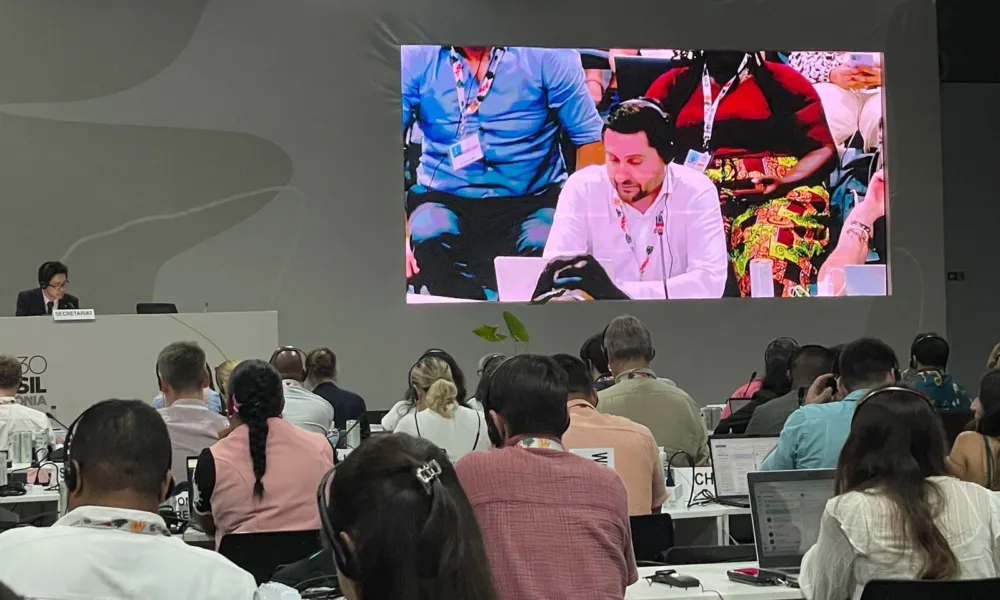
Andrea Bonzanni spoke on behalf of Business and Industry NGOs at an informal consultation on the SBM's report to COP. Source: IETA
In the negotiations
Late on Thursday the Secretariat issued an updated text of the Report of the Article 6.4 Supervisory Body, which introduced some positive proposed changes, but also some disturbing ones.
The draft starts with bracketed options to address the issue of term limits for SBM members: one bracket is "revise" and the other is "revisit in 2028".
The proposed revision to the rules would allow SBM members "to serve more than two terms following a mandatory minimum two-year break on completion of the second term, rather than being permanently excluded from the Body."
We hear that the proposed extension to term limits comes from countries that have SBM members that are reaching the end of their current terms. To us it sets a bad precedent, given that Parties agreed in Baku last year not to reopen the Article 6.4 rules until 2028. "It's negotiators negotiating their careers", said one observer.
The governance section of the draft decision also "requests the Supervisory Body to ensure that experts serving the Supervisory Body provide independent scientific and technical advice and do not have any financial interest in the generation of Article 6, paragraph 4, emission reductions."
We note that the decision in Baku last year specifically referred not just to advisors giving "scientific and technical advice", but also "practical experience", and we are concerned that this draft decision could exclude valuable input from practitioners from the SBM's decision-making.
The other main element of interest to our community are the draft decisions on methodologies and standards.
The draft decision "requests the Supervisory Body to revise the standard: 'Setting the baseline in mechanism methodologies', noting that the proposed approaches contained in this standard – to downward adjust the baseline of Article 6.4 activities – can discourage the development of nature-based solutions and land sector activities.
The text also addresses requests from Costa Rica and Indonesia to encourage the development of tools relating to reversals and permanence.
However, our policy team found a contradictory element in the EU's request in paragraph 29 to "request the Supervisory Body to explore options for recognising temporary carbon storage in biogenic reservoirs and innovative approaches for using such temporary mitigation outcomes, and to make a recommendation on this matter for consideration by the CMA at its eighth session."
From this it appears that while most Parties have accepted that it's desirable to make crediting nature-based activities easier, there are still some that want to revive the use of temporary credits as a safeguard.
The draft text also proposes extending the deadline for national authorities seeking to approve the transition of CDM projects into Article 6.4. There are two alternative deadlines: 30 June 2026 or 31 December 2026.
We note that this is the first iteration of the draft decision text at this COP, and that it's common practice to include everything that Parties have asked for in the early drafts.
Delegates also met for further informal consultations on Article 6.2. Our observers report that the conversation followed much the same line as yesterday; plenty of questions were raised about the effective date of the registry operationalisation, and we heard several Parties saying that they are already thinking about changes they might want to propose for the planned review of the mechanism in 2028.
(That's quite a contrast to the Article 6.4 talks, where some Parties are keen to start revising the rules now!)
Co-chairs were accepting submissions until 10pm on Friday, and will deliver a first draft decision text by tomorrow. They will also consult with the presidency to see if delegates might be allowed to hold another informal session on Saturday.
The CMP also published draft decision text on guidance relating to the clean development mechanism, which include various bracketed options for end-dates for various processes and activities, including operation of the CM registry, requests for issuance of CERs, requests to transfer CERs into the Article 6.4 registry and cancellation of CERs. It's starting to look really final... again.... maybe.
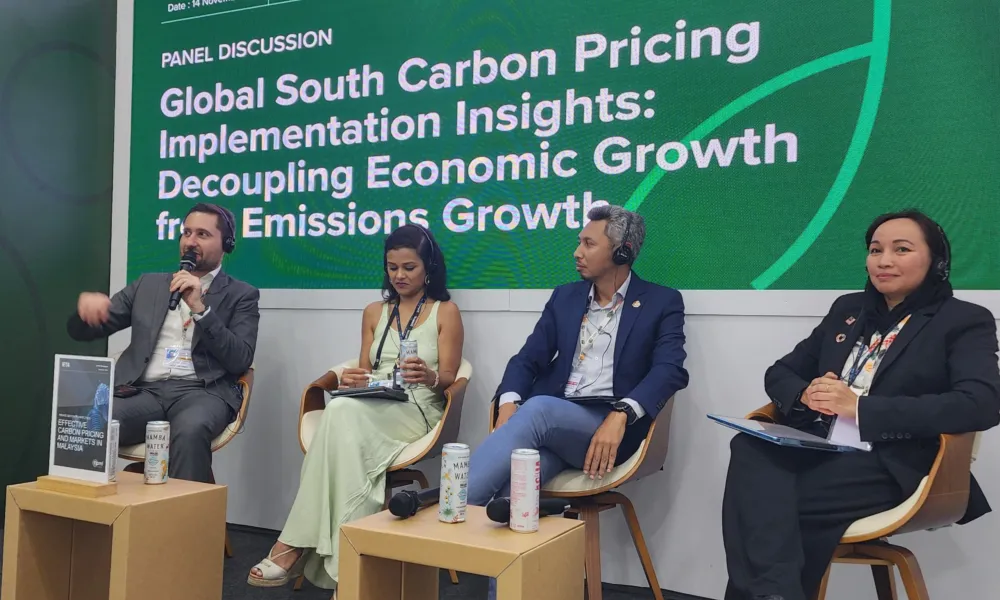
Andrea Bonzanni speaking at the launch of B-PMI's Malaysia white paper. Photo: IETA
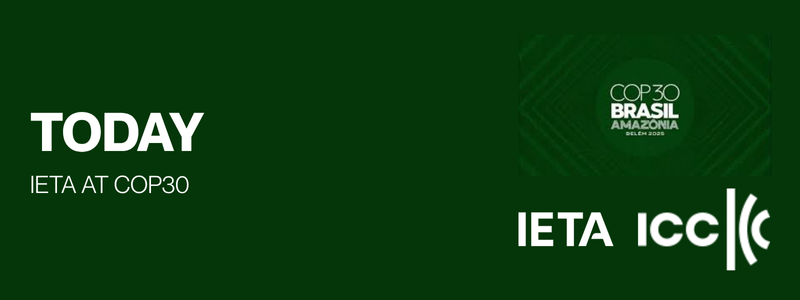
Once again, IETA's policy team fanned out across the COP venue to participate or attend a variety of side events and discussions, demonstrating our knowledge and authority on issues related to markets.
Pedro Venzon represented IETA at a panel discussion organised by Emergent and The Nature Conservancy on jurisdictional programs and the importance of integration of markets.
Also speaking was Cristina Reis, currently responsible for the interim managing body of Brazil's carbon market (SBCE), who shared her country's priorities for implementing the new system, including clear scope definitions, robust MRV rules, a modern registry, accreditation of methodologies, and the establishment of a technical consultative committee.
The panel also highlighted the launch of the Open Coalition on Compliance Carbon Markets, which will hold three technical dialogues — on MRV, carbon accounting, and the use of offsets. The first meeting of the group should take place tomorrow, marking an important step toward coordinated market development and high-integrity implementation of the SBCE.
Andrea Bonzanni represented the Business Partnership on Market Implementation at Malaysia's pavilion for the launch and handover of a white paper on "Effective Carbon Pricing and Markets in Malaysia: Private Sector Perspectives",
Agustina Cundari joined an event at the Chilean pavilion for the formal launch of the Ministry of the Environment's Roadmap for the Articulation of Carbon Pricing Instruments (2025–2035). She highlighted the importance of coordinating diverse carbon pricing instruments across Latin America and the Caribbean to send clear investment signals and avoid overlaps; the importance of heterogeneity of carbon market policies across countries and the need to strengthen dialogue and exchange with the private sector, and avoiding fragmentation among LAC markets and to create public–private fora for joint design and implementation of coherent national policies.
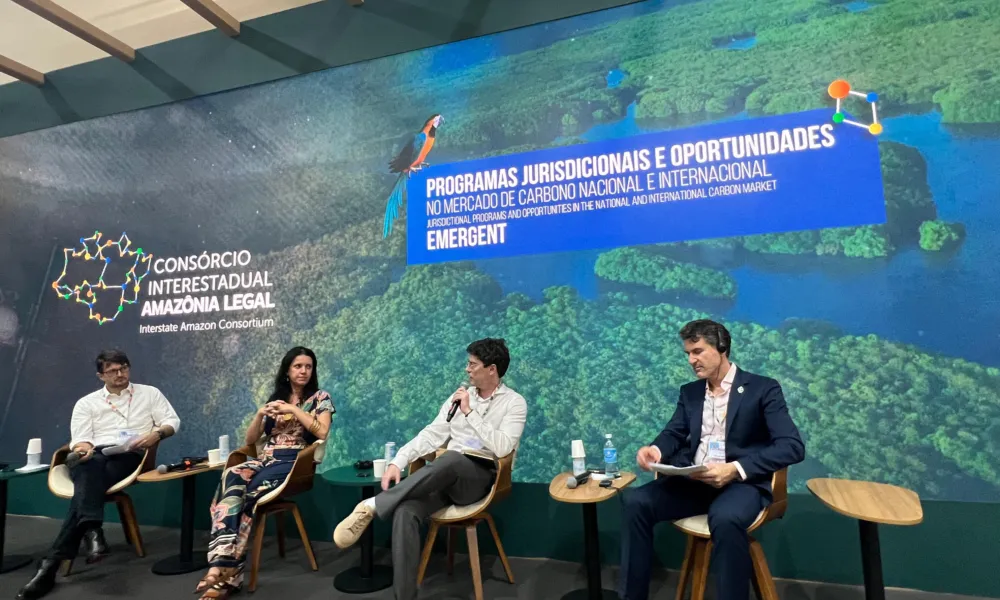
Pedro Venzon speaking at the Emergent/TNC side event on jurisdictional programmes. Photo: IETA
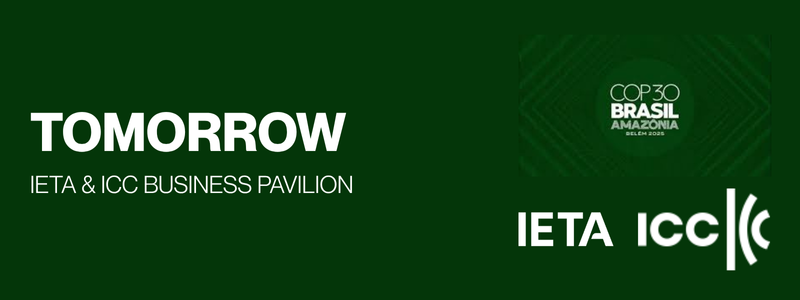
All event times are listed in Brasilia time (BRT), which is three hours behind GMT and 11 hours behind Singapore time.
The IETA/ICC Business Hub is located in Pavilion D145 (see image below). It's in area D of the Delegation Pavilions hall, quite close to the main entrance, and our neighbours are Colombia, the World Meteorological Organisation, Saudi Green Buildings Forum and the Oceans pavilion.
IETA has two side event venues within the Hub: the Boardroom and the Side Event Theatre. You can find the IETA schedule of events here, while the UNFCCC has produced an online schedule of side events here.
We'll be welcoming several partner organisations to the IETA-ICC Business Pavilion on Saturday, starting with CTrees, who host an event at 1215 BRT to launch their ORCHID initiative for the measurement and valuation of tropical forests. Speakers from MapBiomas, the Wildlife Conservation Society, University of São Paulo and the Republic of Congo will join CTrees to discuss the project.
At 1345 BRT the Global CCS Institute and the International CCS Knowledge Centre will discuss key CCS learnings, imparting insights from projects and policy measures that are moving CCS ambitions into action. Panelists from the Global Cement and Concrete Association, the Carbon Capture and Storage Association, the government of Alberta and Mission Zero will participate.
This will be followed at 1430 by a session on Financing Mechanisms for CCS Projects, moderated by the Global CCS Institute and featuring CCS Brasil, the European Investment Bank, the Global Carbon Council and the International CCS Knowledge Centre.
At the same time (1430 BRT), we'll also host a session in our Boardroom on jurisdictional REDD. The government of Argentina's Misiones province and Silvania will present the Misiones Jurisdictional REDD+ Program. A panel of speakers from Silvania, Misiones, Coralia Environmental and Silvania will explore the different roles and activities undertaken by key participants of the program.
Elsewhere at COP on Saturday, Winrock International and DRIS will present a side event on indigenous people-led initiatives and partnerships advancing jurisdictional REDD+. This event takes place at 1130 BRT in Side Event Room 6.
And we're marking your dance cards early for Monday as well: Bhutan will host a session showcasing its progress in building a high-integrity carbon market: from the Bhutan Carbon Market Rules and National Carbon Registry to the country's first Article 6.2 agreement with Singapore. The session will feature a list of potential mitigation projects across sectors such as forestry, energy, waste, and transport, showcasing opportunities for developers, investors, and partners to engage in Bhutan’s evolving carbon market ecosystem. Join Bhutan on Monday November 17 at 1200 BRT in the WGEO Pavilion.
